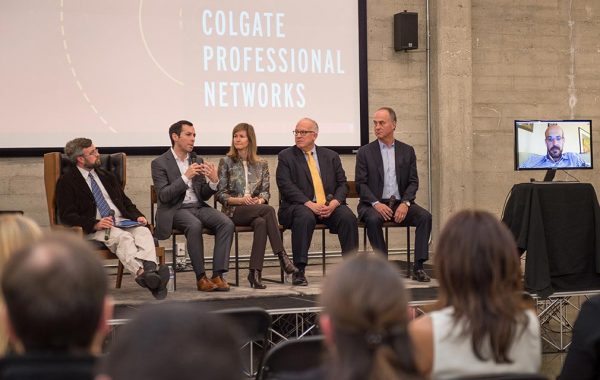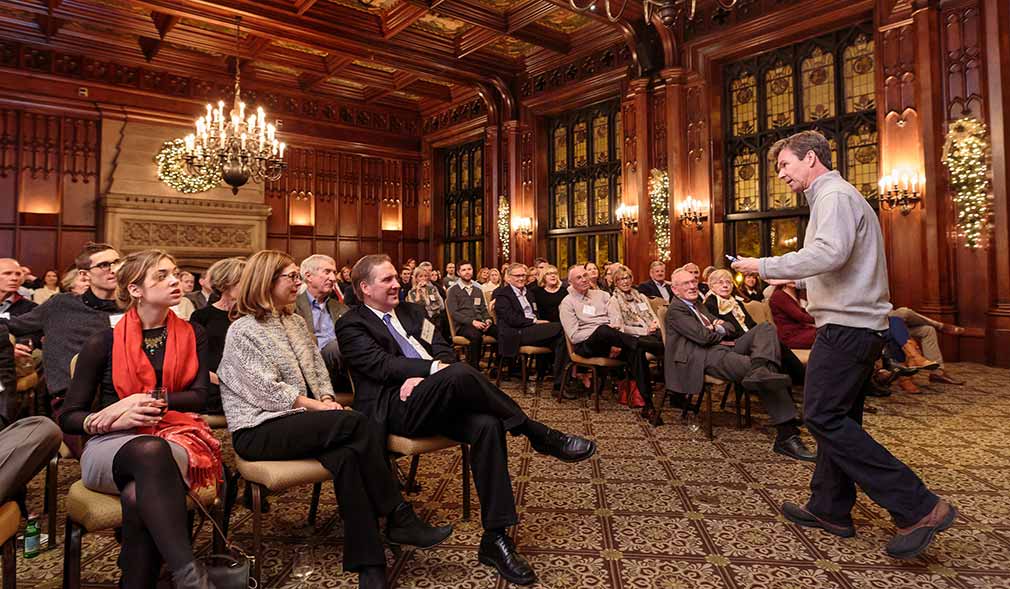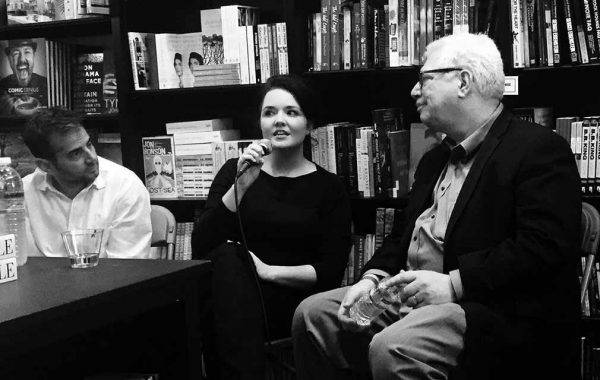The Office of Alumni Relations is pleased to offer many ways for alumni to stay in touch with each other, and with Colgate! E-mail me with questions or concerns at tmansfield@colgate.edu. — Tim Mansfield, associate vice president, institutional advancement and alumni relations. Questions? Contact alumni relations: 315-228-7433 or alumni@colgate.edu
Professor Tim Byrnes on 2016 election
Ten years ago, my husband, Chris Hurley ’81, had an idea.
To engage with Colgate on an intellectual level, we would invite a professor to Chicago for a cocktail party and lecture. For a pair of Colgate political science majors — and parents of another (Matt ’12 and Dan ’12) — the subject was obvious: American politics. A professor could bring intellectual rigor and deep knowledge of American history to a topic that affects everyone.
For most of these last 10 years, Professor Tim Byrnes has been our guest, lecturing about presidential politics. (Last year, Professor Nina Moore switched it up by giving a fascinating and timely lecture about immigration policy — see her report in the winter 2016 Scene.)
We have seen Tim slash the whiteboard with what he calls “the primary cleavage” dividing the major political parties, namely the role of the federal government in ameliorating the economic downturns of the business cycle. He has described the life cycle of political parties: how a dominant party moves from unified to fragmented, until finally its members end up in a “circular firing squad.” Then, the other party gains power and begins the cycle again.
Although this lecture is now a regular event on our calendar, 2016 was quite irregular. A record 150 people came on December 2 to hear how Donald J. Trump had beaten most predictions — including Tim’s. Had the primary cleavage changed? Had the Democratic Party prematurely exhausted itself? It was a more serious evening than usual, and the weight of the election felt heavy in the room. Tim held strong to his original analysis, though, and noted that some remarkable and unique circumstances affected enough votes in key states to change the result. (By the way, none of this has helped improve his opinion of the Electoral College.)
We look forward to continuing the conversation next year with Tim. We may need a stadium to hold all of the attendees. In the meantime, we remain grateful to him, and to Colgate, for the power of a Colgate liberal arts education in fostering the conversations and critical thinking essential to a democracy.
— Becky Hurley ’81
Discussing cancer immunotherapy

Panelists (L to R) Geoff Holm, Gregg Fine ’94, Carin Rollins ’94, Wayne Feinstein ’74, and Tom White P’17. (Photo by Mark DiOrio)
Colgate community members are at the forefront of cancer research, both on the medical and development sides of the field. On November 14, Colgate Professional Networks hosted a panel conversation on cancer immunotherapy in San Francisco.
The discussion, moderated by associate biology professor Geoff Holm, focused on the progress being made in immuno-oncology, as well as issues of access, affordability, and ethics. Gregg Fine ’94, senior medical director at Genentech, opened the talk by explaining that the goal of immunotherapy is to harness the power of the immune system to treat cancer.
“Our bodies have checkpoints to keep our immune system working properly, but cancer cells can coopt these mechanisms to fight off the immune system,” Fine said. Immune checkpoint inhibitors block the checkpoint pathways and essentially release the brakes of the immune system, allowing it to attack cancer cells.
In and around the field of oncology, there is a “hope vs. hype” debate over the value of immunotherapeutic research. Those on the “hope” side believe that the potential of immunotherapeutic drugs makes the cost worthwhile, but skeptics believe that the hype distracts researchers and investors from other potentially successful therapies.
“Immuno-oncology is the next big wave in cancer research,” said Carin Rollins ’94, the CEO of Hinge Bio. “It has huge, untapped potential, beyond the amazing good that it’s doing already.”
One of the issues that causes skepticism is the scarcity of funding. Wayne Feinstein ’74, senior vice president of Capital Group’s Private Client Services and founder of the Gastric Cancer Foundation, noted that federal budget constraints make research difficult.
Tom White P’17 emphasized the importance of venture capital groups investing in researchers and forming foundations to fund them. “If not for small, focused research foundations, there would be a lot of top scientists who couldn’t find enough funding to begin to do their work,” he said.
The panel discussion was live streamed for students in the National Institutes of Health Study Group and the Colgate community worldwide. Watch it here.
It’s time to get in-tents
Take a vacation with thousands of fellow Colgate University alumni — join us under the tents for Reunion 2017, June 1–4. You’ll see familiar faces and experience traditional events like your class banquet, tent entertainment, Reunion College, our welcome-back lunch and barbecue dinner, the Alumni Awards ceremony, Torchlight parade, and fireworks.
Registration is now open! Visit colgate.edu/reunion to choose your favorite reunion package, designed to meet your travel needs, and we’ll see you on Whitnall Field.

L.A. story
It happened on Sunday, October 23, at Book Soup, a well-known independent bookstore on the Sunset Strip in West Hollywood.
A series of Colgate authors read excerpts from their recent publications: Pulitzer Prize–winning author and Los Angeles Times business columnist Michael Hiltzik ’73 from his new book, Big Science: Ernest Lawrence and the Invention that Launched the Military-Industrial Complex; Kevin Glynn ’76 from his novel, Tyrannosaurus Sex; Chris Edwards ’91 from BALLS, It Takes Some to Get Some; and Mary Anna King ’04 from Bastards: A Memoir.
Sponsored by the Colgate Entertainment Group, the event further established the fact that “the Maroon Mafia” is thriving in Hollywood — with its own unique voice.
2017 Alumni Council Nominees
The Alumni Council, upon recommendation of its nominating committee, has approved the following slate of alumni for election at Reunion 2017. The candidates, chosen from approximately 300 alumni, have strong records of varied Colgate volunteer service, a consistent history of giving financial support to Colgate, and meaningful personal or professional accomplishments or contributions to the greater community.
Complete information about the election and challenge petition process, as well as full biographies of the nominees, are posted here. Paper copies are available by calling 315-228-7433, or by sending an e-mail to alumni@colgate.edu.
Era I: Bernard S. Siegel ’53
Era II: Timothy A. O’Neill ’78
Era III: Jon D. Tiktinsky ’82
Era IV: Karl W. Clauss ’90
Era V: Becky Bye ’02
Era VI: Shevorne O. Martin ’08
Era VII: Ian J. Murphy ’10
At-Large: Debra S. LoCastro ’05
At-Large: Robert Austrian ’85








